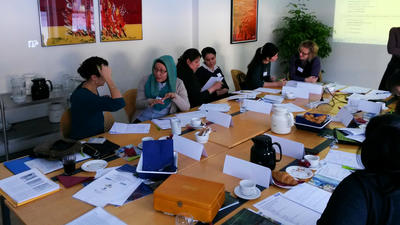-
Our work
-
Fields of work
- Arms control
- Border management
- Combating trafficking in human beings
- Conflict prevention and resolution
- Countering terrorism
- Cyber/ICT Security
- Democratization
- Economic activities
- Education
- Elections
- Environmental activities
- Gender equality
- Good governance
- Human rights
- Media freedom and development
- Migration
- National minority issues
- Policing
- Reform and co-operation in the security sector
- Roma and Sinti
- Rule of law
- Tolerance and non-discrimination
- Youth
- Field operations
- Projects
-
Meetings and conferences
- Summit meetings
- Review Conferences
- Ministerial Council meetings
- Plenary meetings of the Permanent Council
- Plenary Meetings of the Forum for Security Co-operation
- Security Review Conferences
- Annual Implementation Assessment Meetings
- Economic and Environmental Forum
- Economic and Environmental Dimension Implementation Meetings
- Human rights meetings
- Media conferences
- Cyber/ICT security conferences
- Conference of the Alliance against Trafficking in Persons
- Gender equality conferences
- Annual OSCE Mediterranean conferences
- Annual OSCE Asian conferences
- Partnerships
-
Fields of work
-
Countries
- All
-
Participating States
- Albania
- Andorra
- Armenia
- Austria
- Azerbaijan
- Belgium
- Belarus
- Bosnia and Herzegovina
- Bulgaria
- Canada
- Croatia
- Cyprus
- Czechia
- Denmark
- Estonia
- Finland – OSCE Chairpersonship 2025
- France
- Georgia
- Germany
- Greece
- Holy See
- Hungary
- Iceland
- Ireland
- Italy
- Kazakhstan
- Kyrgyzstan
- Latvia
- Liechtenstein
- Lithuania
- Luxembourg
- Malta
- Moldova
- Monaco
- Mongolia
- Montenegro
- The Netherlands
- North Macedonia
- Norway
- Poland
- Portugal
- Romania
- Russian Federation
- San Marino
- Serbia
- Slovakia
- Slovenia
- Spain
- Sweden
- Switzerland
- Tajikistan
- Türkiye
- Turkmenistan
- Ukraine
- United Kingdom
- United States of America
- Uzbekistan
- Asian Partners for Co-operation
- Mediterranean Partners for Co-operation
-
Structures and institutions
- Chairpersonship
-
Secretariat
- Secretary General
- Office of the Secretary General
- Conflict Prevention Centre
- Transnational Threats Department
- Office of the Special Representative and Co-ordinator for Combating Trafficking in Human Beings
- Office of the Co-ordinator of OSCE Economic and Environmental Activities
- Gender Issues Programme
- Opportunities for Youth
- Department of Human Resources
- Department of Management and Finance
- Office of Internal Oversight
- Documentation Centre in Prague
- Institutions
-
Field operations
- Presence in Albania
- Centre in Ashgabat
- Programme Office in Astana
- Programme Office in Bishkek
- Mission to Bosnia and Herzegovina
- Programme Office in Dushanbe
- Mission in Kosovo
- Mission to Moldova
- Mission to Montenegro
- Mission to Serbia
- Mission to Skopje
- Project Co-ordinator in Uzbekistan
- Closed field activities
- Parliamentary Assembly
- Court of Conciliation and Arbitration
- Organizational structure
- About us
Press release
OSCE trains women from Central Asia in advancing their career opportunities in the water sector

- Date:
- Place:
- COPENHAGEN
- Source:
- OSCE Secretariat, OSCE Programme Office in Bishkek
- Fields of work:
- Economic activities, Environmental activities, Gender equality
COPENHAGEN, 27 November 2015 – A one-week training course for female water professionals from Central Asia, jointly organized by the Office of the Co-ordinator of OSCE Economic and Environmental Activities (OCEEA) and the OSCE Gender Section, in co-operation with the Women’s Water Initiative, concluded today in Copenhagen.
Nine water professionals from state agencies, NGOs, private sector and regional organizations from Kazakhstan, Kyrgyzstan, Tajikistan, and Uzbekistan in or on their way into middle management positions took part in the training course.
“Women and men have different responsibilities and roles, and therefore also different knowledge and experience in relation to the environment and the management of water,” said Jenniver Sehring, Environmental Affairs Adviser at OCEEA. “Gender mainstreaming and women empowerment are important aspects to improve water governance, as they can lead to more effective and responsive policies that take specific needs and interest into account and reduce social imbalances.”
The capacity development programme included short courses in career development and project management in the water sector, as well as in water governance and environmental technologies. Participants also visited Danish organizations dealing with water issues and learnt about their experience in water management and conflict resolution.
Hanna Sands, OSCE Gender Adviser, said: “Even though at first glance water management might seem like an issue that is technical and lacks a gender perspective, the truth is that we can’t have efficient water management without taking into account both women and men’s need and usage of it. It is crucial that women form part of the decision-making processes in water management in order to add this perspective, but also to be part of the structures that shape their everyday life.”
After the training course, the Women’s Water Initiative will maintain contact with the participants through a mentoring component. A senior Danish manager will serve as a mentor for each candidate.
Jesper Goodley Dannisøe of the Danish Water Forum, which organized the course on behalf of the Women’s Water Initiative, said that empowerment of women in the water sector is a very important task. “Our experiences from previous courses have shown that this helps not just the women but also their societies.”
The training course is part of the project “Women, Water Management and Conflict Prevention - Comprehensive Approach to Security”, funded by the Governments of Finland, Norway and Switzerland.